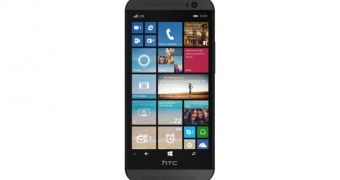Taiwanese mobile phone maker HTC Corporation has been through a long series of rough quarters lately, and it seems that things are not getting any better, at least this is what the company’s financial results for July have revealed.
The company’s unaudited revenue for the last month was of NT$10.6 billion ($353 million/€263 million), which is only half of what it registered for each month in the second quarter of the year.
Over the past few years, HTC has been struggling to regain its foothold in an increasingly competitive smartphone market, and many believed that its latest Android-based flagship device, the HTC One (M8), would help it do that.
Made official in late March and available for purchase since launch day, the mobile phone has been already recognized as one of the best smartphones released this year, yet it seems that HTC still finds it hard to convince users of that.
In all fairness, sales of HTC One (M8) were pretty good during the first months of availability, and the company has already acknowledged that it was happy with how things went.
However, it appears that this device alone is not enough to bring HTC back into the game, and that the handset vendor needs to find a different way to make that happen.
One possible solution might come in the form of a Windows Phone 8.1-based version of HTC One (M8), a device that has been long rumored to arrive on shelves before the end of this year, and which is currently expected to go official sometime in the next two weeks.
Supposedly set to be released under the name of HTC One (W8), the new member of the One family would run under the latest version of Microsoft’s mobile operating system, while packing all of the hardware capabilities that its Android-based counterpart was released with.
What this means is that the phone could arrive on shelves with a 5-inch full HD touchscreen display, a 2.5GHz quad-core Snapdragon 801 processor, 2GB of RAM, 16GB of internal memory, and a microSD memory card slot for expansion purposes.
What sets HTC One (M8) apart from other Android-based flagship devices is the presence of a duo-camera setup on the back, which includes a 4MP UltraPixel camera and a secondary camera for depth of field information. The phone also sports a 5MP front camera.
The high-end device also sports an aluminum unibody design, and the Windows Phone 8.1-based model could feature it as well.
Thus, should HTC indeed launch a Windows Phone 8.1-based HTC One (M8) smartphone, it would offer to the world the most appealing flagship device running under Microsoft’s mobile OS this year.
At the moment, Nokia’s Lumia smartphones are dominating the Windows Phone space, but this is expected to change soon. Nokia is now part of Microsoft, and the Redmond-based software company has already signed deals with a variety of handset vendors out there for the launch of new smartphones.
HTC is one of these, yet it is not new to the Windows Phone. Unfortunately, the Taiwanese company has only a few Windows Phone-based handsets available for purchase at the moment, such as the HTC 8X and 8S, although it once was the largest provider of Windows phones.
However, the company has now the possibility of becoming once again a major Microsoft partner in the Windows Phone space, especially with Nokia gone, and with the mobile operating system starting to pick up Steam.
Over the past few years, Windows Phone has seen a great deal of improvements, and it can finally prove a worthy competitor for Android and iOS, especially now that two new OS versions are official, in the form of Windows Phone 8.1 and Windows Phone 8.1 Update 1.
Rumor has it that HTC One (W8) will run under the Windows Phone 8.1 Update 1 platform version right from the start, which should make it a great option for both HTC and Windows Phone enthusiasts out there.
At the moment, HTC is focused mainly on the release of Android-based devices, but that might change, especially if the Windows Phone-based variant of its flagship handset proves successful, which I believe will happen.
The strong competition from Samsung, LG, Sony, Huawei, Lenovo, Xiaomi, and other mobile phone makers out there, the Taiwanese vendor has little chances to strive in the already crowded Android area, unless it releases a device truly capable of winning users to its side.
As mentioned above, there is no flagship Windows Phone that can stand up to HTC One (W8) at the moment, allowing this device a lot of space to maneuver, while also helping the Taiwanese vendor to increase its revenue.
Of course, a single smartphone might not be able to do wonders, even if it pairs great hardware with the appeal of Windows Phone 8.1, but it could certainly prove to be the starting point of a new series of HTC devices that will help the company re-become what it once was.
HTC clearly needs a new market strategy, since it is somehow failing in the Android space, and I believe that a Windows Phone 8.1-based HTC One (M8) will help it decide what steps it needs to take in order to turn the tables in its favor once again.
The phone is expected to land in the United States at Verizon, and it has been already spotted on the wireless carrier’s website, but it will most probably enjoy global availability, the same as HTC One (M8) does at the moment.
What I am hoping for is that HTC releases it with exactly the same hardware specs as those of the Android counterpart (it might arrive with the Dot View cover too), including the aluminum body. Making any change to the specs list might make the phone less appealing, thus diminishing HTC’s chances to regain some of the ground lost over the past few years.

 14 DAY TRIAL //
14 DAY TRIAL //